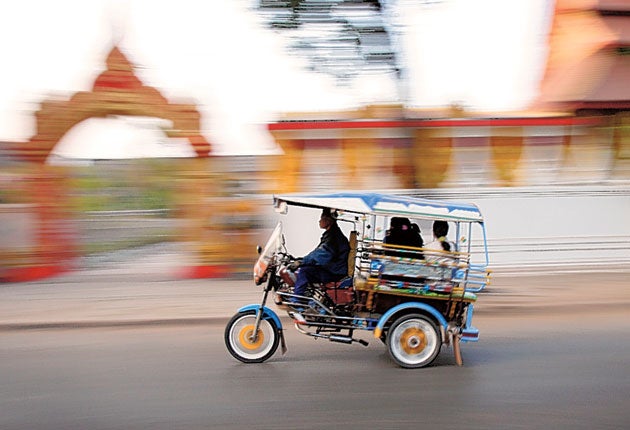Trail of the unexpected: Coffee on the banks of the Mekong, in Vientiane
Laos's capital is steeped in a coffee culture introduced by the French

With a screech of its dirt-clogged brakes, the rust-red tuk tuk shuddered to a stop. I hauled my bag down from the roof and just then, as a saffron-robed holy man wobbled past on a pushbike, the smell hit me. Coffee.
Here, on the broad, frangipani-lined avenues that separate Vientiane's temples from the arabica-brown slosh of the Mekong river, a culture of coffee and croissants reigns supreme. But unlike Paris – a city that has left its mark here decades after French colonialists lost power – the Lao capital remains sedate and unpretentious. You can see it in the food carts that jostle for space along crumbling, bamboo-clad walls, and in the city's countless street-side brasseries, where tall glasses of coffee are sipped under the shade of huge striped parasols.
"The French came here, and now mostly they have gone," said my driver, Boun, who had promised to take me to a "real" Lao coffee house. "But we still have their coffee." At the beginning of the 20th century, the French wondered how they could make money out of this quiet backwater of Indo-China. They decided to plant coffee on the Bolaven Plateau, a cool, river-wrapped upland 300 miles south of Vientiane. Now, coffee is almost as popular among locals as Beerlao – a smooth-as-silk brew described as the Dom Pérignon of Asian beers.
I'd witnessed the power of Lao coffee earlier that morning. I'd arrived, tired-eyed, at the city's main bus station, Talat Sao – a dusty, ramshackle square pockmarked by the constant coming and going of diesel-fired buses. A wrong turn led me to the Talat Sao market, where sagging hessian bags full of sweaty coffee beans lay stacked alongside great bundles of crusty French bread. If there was a pong, the smell of coffee was doing a good job of masking it.
Next month, said an elderly market trader, coffee will serve a more conventional purpose. "Everyone will party," she said, "and Lao people love to enjoy a party. But you can't continue the party if you're tired, can you?" She laughed hard. "Come on, take them," she said, pushing a handful of oily coffee beans into my hand and waving away my offer of cash.
The event in question is a week-long festival to mark the 450th anniversary of Vientiane being declared the capital of Lan Xang, the kingdom that preceded modern-day Laos. There will be kaleidoscopic street dances and parades along the newly beautified bank of the Mekong, which is being transformed into the site of the city's first proper park.
The event coincides with Bun That Luang, a Theravada Buddhist festival that heralds the full moon of the 12th lunar month. At sunrise on the first day of the party, you'll see thousands of monks collecting alms and fragrant floral votives from local laypeople. Then, there'll be a jubilant parade through the city's streets, which winds up at That Luang, a towering golden stupa that doubles as the national symbol of Laos.
Boun dropped me at the approach to the stupa, telling me to walk slowly around it. But I became entranced by its gilded doors and tiny carved Buddha statues. The fading tropical sunlight bounced off its surface, while brown moths the size of cigarette boxes dangled off the brightest spots.
That night, on the short walk back to my hotel, the heavens opened. At this time of year, the downpours can last an hour or more. I darted into the same café where, that morning, I'd learnt about the history of Vientiane's coffee culture. "One coffee, please," I asked the waitress.
"Sorry, no coffee," she replied. "Today, we had too many people. We have to go to the market tomorrow." I almost ordered a Beerlao instead, when I felt the market trader's coffee beans still rattling around in my pocket. I pulled them out, handed them to the waitress, and within seconds, you could hear the wheels of the coffee grinder whirring into action.
Travel essentials: Laos
Getting there
* The author travelled with Bamboo Travel (020-7720 9285; bambootravel.co.uk), which organises tailor-made tours across Laos.
* A one-week stay in Vientiane, including a half-day city tour and stay at the Ansara Hotel (ansarahotel.com), based on two people sharing, costs from £1,099 per person.
* Thai Airways (0870 606 0911; thaiairways.co.uk) flies from London to Vientiane via Bangkok.
Join our commenting forum
Join thought-provoking conversations, follow other Independent readers and see their replies
Comments